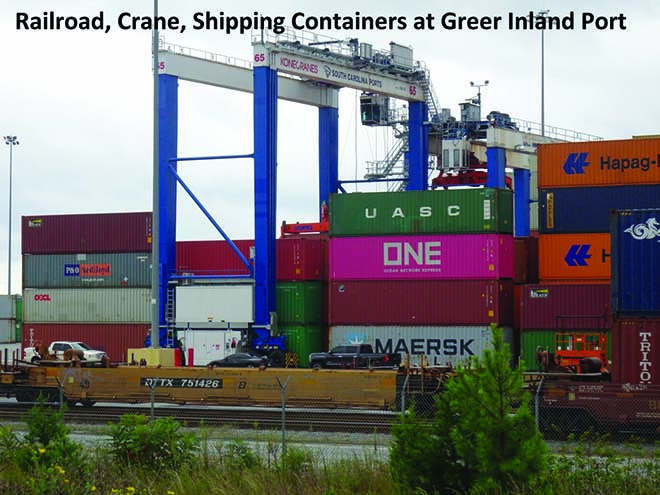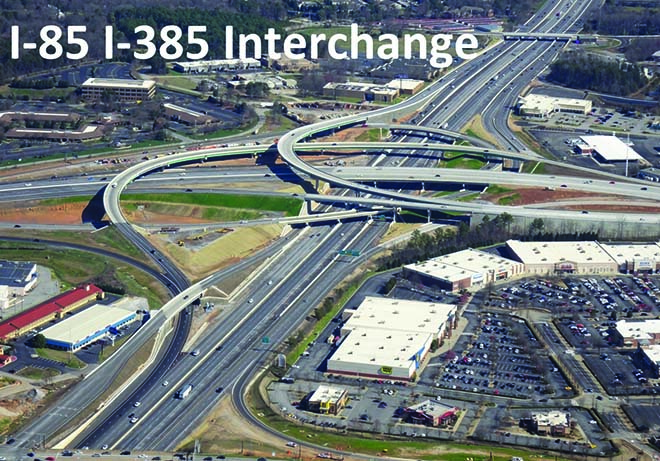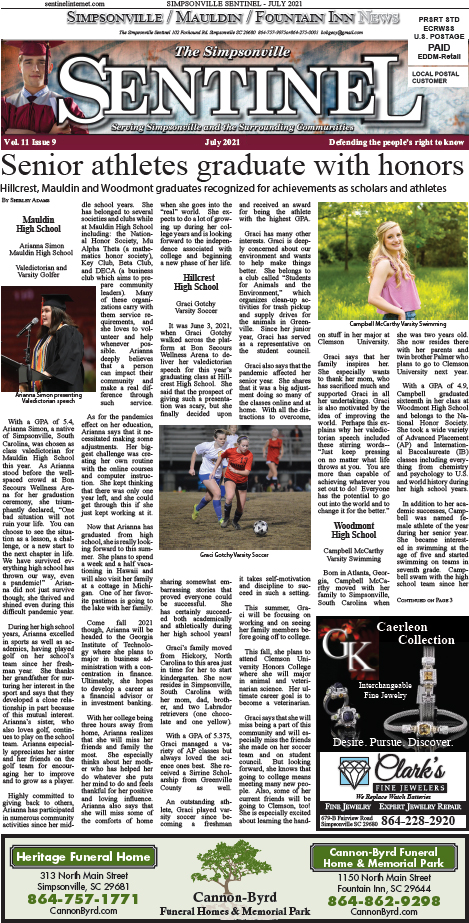It’s a good thing that I like airplanes. My house is directly under the approach path to Runway 04 at Greer International Airport (“GSP”). Seeing (and hearing) a 747 cargo plane flying only 1700 feet overhead as I sit in my backyard is not all that uncommon. The 747 is a beautiful, majestic airplane that just seems to gracefully float along through the air and the deep-throated growl of those four jet engines is a feast for the ears – well, to me, anyway.
Mostly, those 747s are cargo planes, flying non-stop from Germany. They are loaded and unloaded at the cargo facility on the northeast end of GSP. Most of the time, they are filled with parts for automobiles built at the Greer BMW plants. More BMWs are produced in Greer than anywhere else in the world. The BMWs will be sold not only in the U.S., but exported for sale in other countries as well.

GSP’s cargo facility is also a hub for package shipping by FedEx and UPS.
International Shipping and Greer Air transport at GSP is just one part of a bigger picture. Cargo is shipped by air, by water, by rail, and by highway. If that shipping is in the Southeast, no matter what the carrier, there is a good chance it will come through Greer.

The Greer locale is a major contributor to the growth of the South; it is at the heart of a number of the South’s economic arteries. The whole Upstate, including the cities of the Golden Strip, benefit from that in a big way, with increased goods and services, and more and better-paying jobs.
The Greer Inland Port is a major U.S. hub for international shipping. Charleston harbor is America’s eighth largest port, with most traffic being in the ubiquitous shipping containers. More than $75 billion worth of goods passes through the port each year, 2/3 import, and 1/3 export. To speed the delivery of those millions of containers, many are loaded from the ships directly onto Norfolk Southern railroad cars, and taken to the Greer Inland Port. Only then do they undergo Customs inspection and routing to their ultimate destination, via railcar or truck.
From the Inland Port, containers move via the Norfolk Southern and CSX railroads to destinations in the Southeast, the Ohio Valley, and Chicago. Most cargo from China is shipped to ports on the West Coast. But it is usually cheaper to send cargo ships from Southeast Asia and India through the Panama Canal, for delivery to East Coast ports like Charleston and its primary competitor, Savannah.
Investors know that. Most of the shipping that goes through Charleston continues on via Norfolk Southern and CSX railroads. As the volume grows, so does their income, and their stock prices. Increased shipping through the port of Charleston means that buying stock in Norfolk Southern and CSX – two major economic arteries – is likely to be a good long-term investment.
For destinations less than 200 miles from the Inland Port, trucks carry most shipments. Trucking makes Interstate highways crucial economic arteries. We have all witnessed the construction on I 85 and I 385 over the past several years, to accommodate the growth of traffic. Good highways are essential to economic growth in South Carolina – not only for trucks, but for the automobiles that carry us all to destinations near and far, for work and for pleasure. Good highways mean better living for residents of the Golden Strip.
The Golden Strip
The cities of the Golden Strip have their own local economic artery: the Carolina Piedmont Railroad (CP), which provides essential transport services for the General Electric plant and a number of other plants from Mauldin to Laurens. The CP connects with CSX in Laurens, providing access to the rest of the country and the world. The CP delivers materials to local businesses, and carries away goods to be shipped to customers. The millions of dollars of goods shipped by the CP mean better jobs for Golden Strip local families, as well as the greater availability of better and more economical goods.
But “economic arteries” does not just include the ones you see: highways, railroads, ships, and airplanes. Economic arteries include some that are unseen, like Mauldin’s Chamber of Commerce. Along with its more visible responsibilities, such as promoting local businesses through ribbon-cuttings and Business After Hours gatherings, that organization serves three vital purposes that are not typically apparent.
Potential international customers for Mauldin businesses will initially contact the Chamber, to request a notarized confirmation that the particular business is in good standing. International companies recognize America’s local Chamber of Commerce organizations as being independent entities which they can trust to verify the legitimacy of potential business partners. The Chamber opens doors to international sales for Mauldin companies, making it a crucial economic artery.
The Chamber is also frequently contacted by businesses considering a move into Mauldin. The Chamber provides assistance to businesses large or small, including putting businesses in touch with Van Broad, Mauldin City’s Director of Economic Development. The Chamber and the City work hand-in-hand to make Mauldin attractive to prospective businesses, facilitating corporate moves and additions of new plants or stores – things that mean improved opportunities for jobs, goods, and services for Mauldin residents.
Surprisingly, the Chamber of Commerce also serves as an artery for many individuals and families who are considering Mauldin as a new place to live. The Chamber frequently receives calls from people all over the U.S. who are considering moving to Mauldin either for a new job or as a place to retire. Those new residents, of course, add to the strength of the local economy, keeping it dynamic and growing. Economic arteries do not have to be obvious to be essential; the Mauldin Chamber of Commerce is definitely a prime example.

All that traffic – people and goods – needing transportation means just one thing: a growing, dynamic economy.
A growing economy means more and better jobs – more people needed to design, assemble, ship, and sell the goods and services people want to buy. The crucial need for those jobs means more income for Golden Strip residents. The economic arteries reach into our homes and the well-being of our families.
Our local economy is the sum of all local business activity. Famous Economists like Adam Smith, Karl Marx, Ludwig von Mises, John Maynard Keynes, and Milton Friedman have developed some of the most renowned economic theories. But what is “economics” to each of us personally?
To the city governments of the Golden Strip, it means attracting businesses. Those businesses increase the number of available jobs, goods, and services. Buyers include not only residents, but people from the Greenville area and around the world. By visiting the City and by buying its products, they help to increase the well-being of its residents.
For each of us as residents, a growing economy has a personal impact: better jobs, higher income, better choices of the things we want to buy, better schools, more opportunities for our kids – the list goes on and on. The details of economic growth are the well-being of each of us, individually.
That economic growth and well-being depends on all those economic arteries moving the goods from where they are produced to where they will be finally purchased. It feels complex, but it is only the individual purchases each of us makes, combined with someone’s individual efforts to produce the things we each want to buy.
When you see highways full of cars and trucks, when you see trains rolling through the Golden Strip, when you see the jets flying overhead, when you see the big container ships in Charleston harbor, smile – you are seeing the things that make it possible for you to build a better life.

What makes that economic well-being possible? The answer is simple: the possibility of enjoying the fruits of your labor. That enjoyment is possible only to the degree that you have the freedom to act and to reap the benefits. The traffic you see is people who are endeavoring to make their lives better, in a country where they have more freedom – and thus more potential – to achieve that goal.
Government regulation, interference, and taxation are roadblocks to peoples’ ability to achieve, to build personal success – to have the freedom to succeed. Beyond protecting that freedom, through laws, law enforcement, and the military, government hurts, not helps. Freedom and economic well-being are inextricably tied together.
You have heard the phrase, “Make America great again.” Personal achievements are what make America great; they are the most important thing in the world. Ask anyone who is working to achieve them.■

